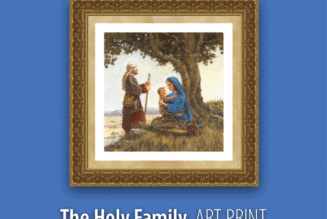, April 23, 2020
We are all the disciples on the way to Emmaus this Third Sunday of Easter, Year A.
The Scriptures continue to speak to our times so specifically that it seems as if God planned it that way. Which of course he did.
The disciples in Luke’s Gospel were anxious and afraid. The bright future they had a few months ago was gone.
We do not know much about these disciples, and that is helpful; they stand for each of us. They are going to “Emmaus” but we don’t know where that was, and that is also helpful; it turns the focus to where they were leaving, Jerusalem, the place Jesus has been journeying to throughout Luke’s Gospel.
Their friends were hiding behind locked doors. Local authorities were treating them like a threat to the public. Their religious leaders were part of the problem.
So the disciples did something definitive: They walked away from the life they had known. That decision drew Jesus to their side.
He “walked with them, but their eyes were prevented from recognizing him,” says the Gospel. He asked them, “What are you discussing as you walk along?”
And they began to reveal to this man they thought was a stranger what they really believed about the man we thought was their friend.
Jesus had revealed himself to them to be the son of God. But they say he “was a prophet.”
They knew Jesus claimed to be something radical and new and total, whose death gave life a new meaning. But they say, “he was a teacher.”
They have sentimentalized Jesus, turned his death into merely the unfair treatment of a fine man, and blame everyone but themselves for their dejected state.
“The chief priests and rulers both handed him over,” they say. They don’t mention that Jesus had said this had to happen and that Jesus consented to it, let alone that it has anything to do with their own sins.
They do mention that some women told them about the resurrection. But you know how women are when they get excited about religion, they seem to say. They go too far and you can’t trust what they say. In fact, the disciples hide the most important thing about the women’s testimony: The women saw, and touched, Jesus.
The bottom line for the disciples is their self-pitying message, “we were hoping that he would be the one to redeem Israel.” But that wasn’t to be, they thought.
You can hear the opinions of the 21st century in what they say. Something like this:
Jesus is a nice imaginary friend who helps some people feel better, but don’t treat him like he’s the most important thing in life. If you do, he will just disappoint you.
And it is not our fault he is so disappointing. It is the Church’s fault. It is the politicians’ fault. Jesus is alright, but the real power is the bishop, the governor, the president, the Pope. They are too liberal or too conservative and they keep spoiling everything.
Yes, there are people who seem filled with faith and hope. They are mostly women. They keep pushing the Divine Mercy devotion and the Rosary and are always going on about their experience of the Lord, but you know what those women are like.
We had hoped for so much more, for a triumph over the enemies of justice, truth, and purity, but what did we get? A faithless Church, a wicked, imprudent government, and a nation going down the tubes.
“Oh, how foolish you are!” Jesus says; but then he gets more specific.
He calls the disciples “slow of heart to believe.” Think of this. He is tying their foolishness to their hearts, not just their heads.
This is the Gospel of Luke, in which Mary ponders truths in her heart; where the good seed takes root when it finds a “generous and good heart,” where Jesus says, “A good person out of the store of goodness in his heart produces good, but an evil person out of a store of evil produces evil; for from the fullness of the heart the mouth speaks.”
The problem isn’t in their intellect; it’s in their heart, the center of their being. They are slow to see what is going on because they are not generous, open and loving.
Jesus goes on to explain the law and prophets to them, such that their hearts begin “burning within them.” That is what it feels like when your heart is pried open and lets in the light.
They discover that it is themselves, not the situation around them, that is causing them such agony.
Once Jesus puts their priorities back in order the disciples are full of gladness, and they urge him, “stay with us, for it is nearly evening and the day is almost over.”
What would happen if we asked Jesus to stay with us, with sincerity and openness and urgency, instead of complaining so bitterly about everything around us?
We would find our life transformed.
We would no longer be like the downcast disciples on the way out of Jerusalem, but like the energized disciples on the way back. We would be like Peter in the first reading, filled with faith and joy because Jesus has destroyed death.
We would be like Peter in the second reading. He has stopped blaming others but knows that Jesus was “ransomed” for our sins, and that an inner joy can fill your life no matter what circumstances you are in.
Peter had suffered the worst the world had to offer and it didn’t dim his spirit because he belonged to Jesus, and Jesus “was known before the foundation of the world but revealed in the final time for you, who through him believe in God who raised him from the dead and gave him glory, so that your faith and hope are in God.”
This is the encounter Jesus prepares for us at each Mass, where he disappears into the Eucharist for us as he did at Emmaus.
But it comes only if we quiet our self-pity and open our hearts to what Jesus is saying with the events of our time.
Tags: prayer, Sunday Gospel, Sunday Readings, Third Sunday of Easter
Never miss a post! Subscribe below to our weekly newsletter.









